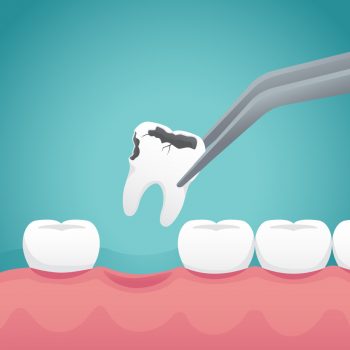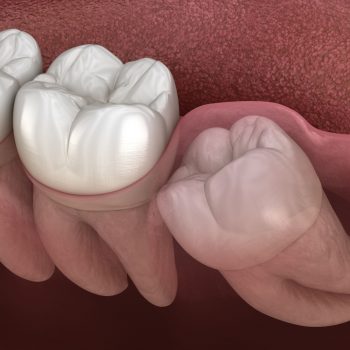A Healthier Smile Through Tooth Extraction Services
At Zajac Dental in Oakville, ON, we understand that maintaining a healthy smile sometimes involves the removal of problematic teeth. Dr. Pawel Zajac and our dental team are here to guide you through the process of tooth extractions, whether it’s a routine extraction or a more complex surgical procedure.
In this helpful guide, Dr. Zajac explains the many benefits of tooth extraction and how removing a problem tooth can benefit your oral and overall health. If you’re dealing with problem teeth, contact our Oakville dentist today by calling 905-901-3824 to schedule an appointment.
What Is Tooth Extraction?
Tooth extraction is a dental procedure in which a dentist or oral surgeon removes a tooth from its socket in the jawbone and gum tissue. This procedure is typically performed when a tooth is damaged, decayed, infected, or causing other oral health issues that can’t be resolved through restorative treatments like fillings, dental crowns, or root canals. Tooth extraction may also be recommended for orthodontic purposes, or to create space for dentures or dental implants.
There are two primary types of tooth extraction: non-surgical and surgical.
Non-Surgical Extraction
Non-surgical extraction, or simple extraction, is a relatively straightforward procedure where the dentist uses specialized dental instruments to loosen the tooth and gently remove it from the socket. Non-surgical extraction is typically performed for teeth that are fully visible and intact, such as incisors, canines, and premolars.
Surgical Extraction
Surgical extraction, or complex extraction, is performed when a tooth is impacted (partially or completely submerged in the jawbone) or when it’s broken and can’t be easily removed with standard techniques. It may involve making a small incision in the gum tissue, removing bone tissue if necessary, and carefully extracting the tooth. Surgical extraction is often necessary for impacted wisdom teeth.
Understanding Wisdom Teeth and Common Problems
Wisdom teeth, also known as third molars, are the last set of molars that typically emerge in late adolescence or early adulthood. They often pose problems, such as:
- Impaction: Wisdom teeth may not have enough space to emerge properly, leading to impaction, which can cause pain and swelling.
- Crowding: The emergence of wisdom teeth can crowd existing teeth, leading to misalignment.
- Infection: Partially erupted wisdom teeth can be prone to infection and gum disease.
- Cysts or Tumors: Rarely, wisdom teeth can develop cysts or tumors, necessitating their removal.
For reasons such as these, most dentists recommend that wisdom teeth be removed as soon as possible, preferably before they’ve fully developed. Removing wisdom teeth before they’re fully grown helps ensure they don’t anchor themselves to the jawbone and the surrounding nerves, so there’s less chance of post-surgical complications.
Benefits of Tooth Extractions
It’s normal for people to not relish the thought of giving up one of their natural teeth. Rest assured that we only recommend tooth extraction in cases where it will directly benefit your oral health.
There can be numerous benefits to undergoing tooth extraction when needed, including:
- Pain Relief: Extractions relieve pain caused by damaged or infected teeth.
- Preventing Infection: Removing infected teeth prevents the spread of infections to adjacent teeth or other parts of the body.
- Space Creation: Tooth extractions create space for orthodontic treatments, ensuring a properly aligned smile.
- Improved Oral Health: Removing problematic teeth can improve overall oral health and prevent future issues.
To schedule an appointment with our Oakville dentist, contact our dental office today.
Who Qualifies for Tooth Extraction?
Tooth extractions are recommended for various situations, including the following:
- Severely decayed or infected teeth that are beyond repair
- Teeth with advanced periodontal disease
- Crowded teeth that impede orthodontic treatment
- Impacted wisdom teeth causing pain or potential oral health issues
- Teeth that are damaged due to trauma or injury
- Preparation for dentures or dental implants
The Tooth Extraction Process
Consultation
Before any extraction, a consultation with Dr. Zajac is essential. During this appointment, we’ll assess your dental health, discuss your symptoms or concerns, and determine the most appropriate treatment plan. Your consultation is a great time to ask any questions or voice any concerns you may have.
Preparation
Prior to the extraction, our team will ensure you’re comfortable by administering local anesthetic or dental sedation, depending on the complexity of the procedure and your preferences.
Surgical or Non-Surgical Extraction
For non-surgical tooth extraction, the tooth will be loosened using dental instruments such as a lifter or dental elevator. Then, it will be gently removed from the socket. It’s typically used for intact, visible teeth.
For a surgical tooth extraction, Dr. Zajac will make a small incision in the gum, removing bone tissue if needed, and extracting the tooth carefully. In some cases, the tooth may need to be sectioned into pieces to make it easier to remove through the incision.
Follow-Up Appointment
Be sure to attend any follow-up appointments with Dr. Zajac. He’ll make sure the surgical site is healing properly and can also suggest tooth replacement options.
Tooth Extraction Aftercare
To ensure a smooth recovery after tooth extraction, make sure you’re following the aftercare instructions provided by our Oakville dentist. Here are some general guidelines that are typically recommended:
- Pain Management: Take pain medications as prescribed by your dentist. If the pain doesn’t begin to subside in two days, or increases after two days, please call our dentist’s office by dialing 905-901-3824. Dr. Zajac will diagnose any possible problems you’re having and offer solutions.
- Soft Diet: Restrict your diet to liquids and soft foods that are comfortable for you to eat. Avoid chewing on the surgical site. A liquid or soft diet is recommended for the first 24 hours after tooth extraction. You can eat normally as soon as you’re comfortable
- Oral Hygiene: Maintain oral hygiene while avoiding the extraction site during brushing. Rinsing shouldn’t be done the day of tooth extraction surgery. On the day after surgery, gentle rinsing with warm salt water should be done after each meal
- Regular Follow-up Appointments: Schedule regular follow-up appointments with Dr. Zajac to monitor healing.
- Swelling: After the tooth is extracted, you may feel some pain and experience some swelling. An ice pack or an unopened bag of frozen peas or corn applied to the area will keep swelling to a minimum.
- Keep Your Head Elevated: To avoid throbbing around the extraction site, keep your head elevated for two to three days after oral surgery.
- Prevent Dry Socket: Dry socket is a painful condition that can occur when the blood clot that forms in the extraction site is dislodged or dissolves prematurely. To ensure the extraction site heals properly, avoid smoking, drinking through straws, and rinsing vigorously.






Frequently Asked Questions
Are tooth extraction services covered by insurance?
Can I drive home after a tooth extraction procedure?
How long should I wait to resume normal activities after a tooth extraction?
Are there any age restrictions for tooth extractions?
Call Zajac Dental For Gentle Tooth Extractions
Don’t be afraid to let go of problematic adult teeth. At Zajac Dental, we can gently and efficiently remove these teeth to improve your oral health and protect your smile! If you think you require tooth extraction services, contact Zajac Dental by dialing 905-901-3824. You can also fill out and submit our online contact form and one of our friendly team members will get back to you shortly.
Zajac Dental offers tooth extraction services to patients from Oakville and surrounding areas such as Flagarwood, Holton Heights, Sunningdale, and West Oak Trails, ON.